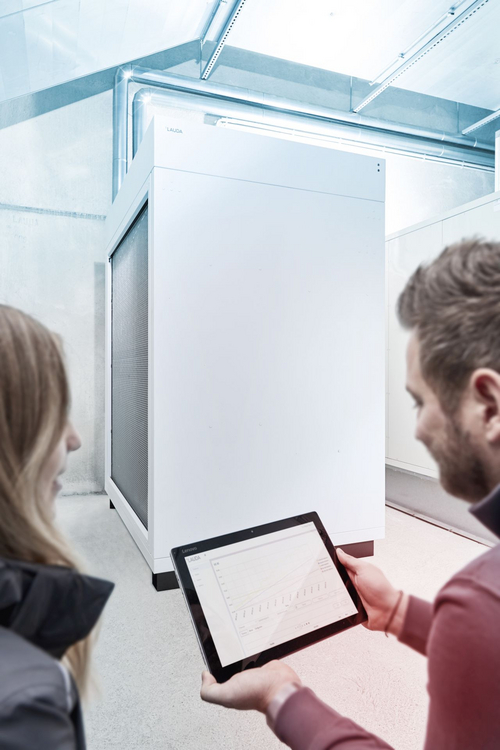
LAUDA Ultracool Umlaufkühler lassen sich per Webserver über PC oder sogar mobile Endgeräte steuern. Die Geräte sind zudem an die LAUDA Cloud angebunden.
LAUDA presents new Ultracool circulation chillers from -10 to 35 °C according to the Ecodesign...
LAUDA, the world market leader in precise temperature control, presents a new generation of ultra-modern circulation chillers of the Ultracool series which have been developed with a focus on energy efficiency and in compliance with the European Ecodesign Directive. LAUDA has also set new standards in the digitalization of temperature control processes as a result of the integrated web server, which permits control via mobile devices, as well as the connection to the LAUDA Cloud. Industrial circulation chillers are often used in continuous operation. They cool applications used e.g. in the printing industry, machine and plant construction and metal working. Companies are increasingly focusing on energy-saving and sustainable measures as part of the energy revolution; the need for energy-efficient options to control the temperature of industrial processes is also constantly increasing.
LAUDA Ultracool circulation chillers with an energy saving of up to 50 percent
The new LAUDA Ultracool circulation chillers have been developed in compliance with the European Ecodesign Directive 2009/125/EC, in order to meet customers' requirements for energy- and resource-saving products. The Directive defines limit values for energy efficiency which process circulation chillers must fulfill. This turns the new Ultracool devices into extremely efficient industrial circulation chillers. The design allows energy costs to be reduced by up to 50 percent depending on the operating conditions compared with conventional chillers which are not Ecodesign-compliant. This not only reduces operating costs but also provides payback times of less than one year.
LAUDA Ultracool: Prepared for Industry 4.0
The new circulation chillers are equipped with an LCD remote control with a cable connection as standard. An Ethernet interface for connection to a computer or local network (LAN) is also integrated as standard. In addition, the intelligent connectivity concept of the new Ultracool circulation chillers provides flexible operating options. For example, the Ultracool devices can be controlled by means of a web server via a PC or even mobile devices - an Internet connection is not necessary. The new LAUDA Ultracool circulation chillers are also among the first devices from the world market leader in temperature control technology to be connected to the LAUDA Cloud. This enables data exchange and monitoring from any computer with an Internet connection – irrespective of the location. LAUDA will systematically expand its Cloud offer from 2020 onwards and offer services such as predictive maintenance to avoid downtimes.
Ready for any customer requirement
LAUDA Ultracool circulation chillers cool precisely in an extended operating temperature range from -10 to 35 °C with a temperature stability of ±0.5 K. The protection class IP 54 allows outdoor installation, and fan control as standard guarantees operation at ambient temperatures down to -15 °C and reduces noise emission. LAUDA has been able to reduce the footprint in comparison with equivalent previous models. All the new LAUDA Ultracool circulation chillers can be optimized for any customer-specific requirement thanks to numerous options such as speed-controlled pumps or flow meters. The bi-frequency power supply (50/60 Hz) enables worldwide use.
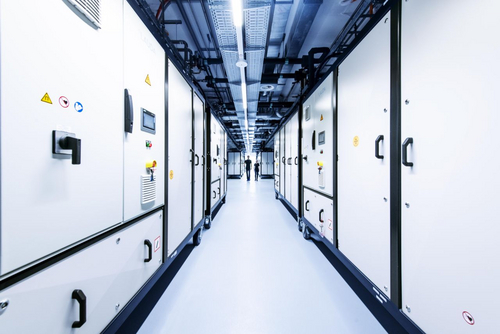
Die LAUDA Temperieranlagen bei Bertrandt in Ehningen. (Quelle: Bertrandt)
LAUDA provides temperature control for test processes for electromobility
The ongoing development and ever greater acceptance of new drives which use electricity or hydrogen poses new challenges for automobile manufacturers. Suppliers and service providers who support established automobile manufacturers with their know-how are a crucial success factor for dealing with electromobility. Bertrandt AG provides its customers with test stands with climatic chambers to test high-voltage batteries from the module level and hybrid batteries to batteries for all-electric vehicles under various climatic and load conditions. The components are exposed to a wide variety of conditions in climate simulations or accelerated aging in fatigue tests. Bertrandt has successfully offered these industry-specific development services for over 40 years and is a globally operating company with around 13,000 employees and 57 locations. This year the company built one of the largest high-voltage battery test centers in Germany in Ehningen. Bertrandt has put its faith in temperature control technology from LAUDA to equip the new test chambers.
High-precision temperature control down to -40 °C
In addition, the company has ordered Process Cooling Units with volume flow control from LAUDA which meet the high demands of customers in the automotive sector. The units are used to control the temperature of test specimens inside a climatic chamber, such as HV storage devices, i.e. high-voltage batteries, which are used in electric cars as well as solar systems. The customer uses two large SUK 400W units for performance tests and ten additional SUK 350W units for endurance tests and simulation runs. The Process Cooling Units precisely control the temperature from -40 to 120 °C.
The special feature: LAUDA develops the refrigeration systems with a water/glycol mixture as the temperature control medium and a single-stage schema cooling circuit. By dispensing with a cascade refrigeration system, LAUDA can guarantee the future-proofing of the design with regard to the European F-Gas Regulation, since a refrigerant with a high GWP value is not required for the second stage. The refrigeration system must have sufficient power reserves, in order to be able to guarantee precise control even at limit temperatures around -40 °C. Each individual Process Cooling Unit must be precisely tailored, since water/glycol mixtures begin to freeze at temperatures around -45 °C (depending on the concentration).
Fully automatic filling facilitates test processes
LAUDA has equipped the Process Cooling Units with fully automatic filling and draining of the test specimen, in order to facilitate the testing processes of the customer in the automotive sector. This technology, which has been in LAUDA's product range for a long time, is now being requested by more and more customers and is becoming the industry standard, explains Manuel Faulhaber, Project Manager at LAUDA Heating and Cooling Systems. Since Bertrandt is a service provider which serves a wide variety of customers, the systems have also been designed with fully automatic filling and draining of the entire system. Bertrandt is therefore able to use a wide range of customer-specific temperature control media for its test procedures without cumbersome manual filling and draining - a massive time saving for the service provider.
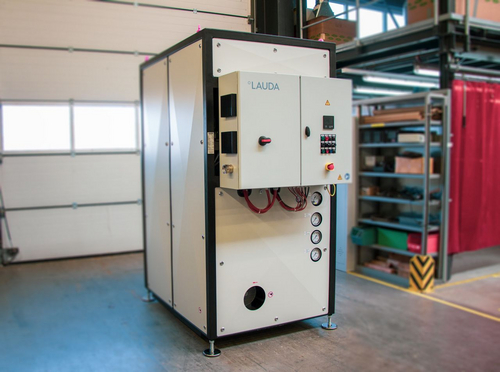
Königsklasse 400 °C: Anlagen in dieser Temperaturgröße ermöglichen eine effektivere Wärmeübertragung, einen höheren Durchsatz und damit die Optimierung von temperaturrelevanten Produktionsprozessen.
LAUDA manufactures high-temperature system up to 400 °C for German chemical company
LAUDA Heating and cooling systems, the plant construction division of the world leader in precise temperature control, specializes in the manufacture of individual solutions based on customer requirements. In this respect, the experts from LAUDA hold sway over a temperature range from -150 to 550 °C which is required for production facilities in the pharmaceutical industry or test stations in the automotive sector. The temperature control specialist has now designed and manufactured a heat transfer system for a long-standing customer, one of the biggest German chemical companies. This was also quite the exception for the experienced engineers at LAUDA.
The customer ordered a system which must reach a working temperature of 400 °C without any problems. The heater is used in the field of materials research, in so-called scale-up tests and for the preparation of reactions which make such a high temperature essential. "Heat transfer systems with a working temperature range up to 350 °C are part of the day-to-day business of LAUDA", says project manager Ralph Herbert. "The range up to 400 °C is in the premier class." However, this is increasingly in demand in the meantime, according to Ralph Herbert, because it allows more effective heat transfer, thereby enabling a higher throughput and optimization of temperature-relevant production processes. Depending on the requisite outflow temperature and application area, these heat transfer systems use various types of thermal oils (silicone oil or eutectic mixtures). Generally speaking, they are electrically heated and generate a temperature-controlled liquid flow which heats the customer application in turn. A cooling option via heat exchanger can be integrated depending on requirement.
In-depth technical expertise essential
The particular feature of the jump from 350 to 400 °C is that the engineers at LAUDA have to deal with significantly higher working pressures. The stainless steel reactors used on the application side also have to withstand a higher load. "The maximum pressure in the heat transfer fluid circuit in normal heat transfer systems with thermal oils is 6 bar, but it increases up to 21 bar in the 400 degree systems, depending on the thermal oil used", explains Ralph Herbert. This requires expertise in pipeline construction and the individual equipment components which not every manufacturer can offer.
LAUDA manufactures heat transfer systems in this high temperature range several times a year – whereby the planning and design are always especially important aspects for the LAUDA experts, confirms Ralph Herbert. The team of engineers at LAUDA is currently planning thermal oil systems with a maximum working temperature of up to 430 °C. The system was completed on schedule for the customer from the chemical industry, inspected and approved in the test bed at LAUDA and then commissioned on site together with the customer.
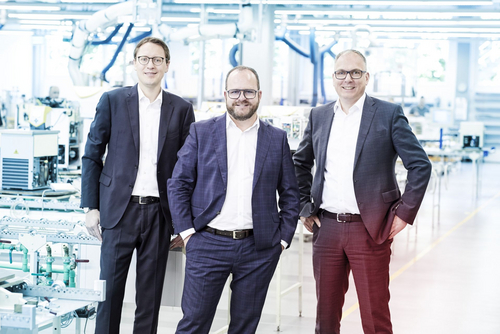
Die LAUDA DR. R. WOBSER GMBH & CO. KG wird seit 2015 kontinuierlich im Weltmarktführerindex der Universität S. Gallen gelistet. Im Bild: Der Geschäftsführer Dr. Mario Englert, der Geschäftsführende Gesellschafter Dr. Gunther Wobser sowie der Geschäftsführer Dr. Marc Stricker (v. l.).
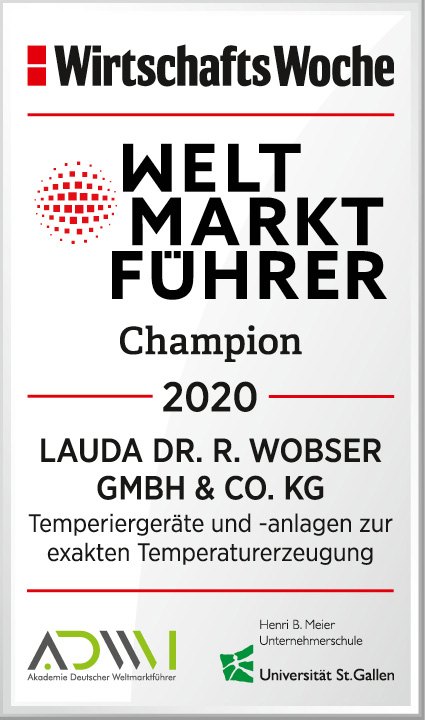
Erneut wurde LAUDA mit dem Siegel der Weltmarktführer ausgezeichnet.
LAUDA again named world market leader
For the fourth time in a row since 2016, LAUDA DR. R. WOBSER GMBH & CO. KG has been appointed world market leader in the field of "Constant temperature equipment and systems for precise temperature control". The list of world market leaders is drawn up annually under the direction of the economist Prof. Dr. Christoph Müller from the renowned University of St. Gallen. The WirtschaftsWoche business magazine has been awarding this prize since 2016. LAUDA has been a member of the world market leader index since 2015.
»We are very proud to receive this award again,« explains Dr. Gunter Wobser, President and CEO of LAUDA. »The repeated confirmation of our achievements shows us that our two locations in Germany and our twelve foreign subsidiaries mean that we are excellently positioned internationally. By acquiring the laboratory equipment manufacturer GFL, we have further expanded our product range and strengthened our portfolio in the field of laboratory technology.« An important part of the innovation strategy of this family-owned company with around 510 employees is the consistent cooperation with innovative start-ups. LAUDA recently announced a cooperation agreement with ENER-IQ GmbH. The company is developing a data platform based on artificial intelligence to increase the efficiency of heating systems. Since the end of 2018, the company has also been working with a multi-award-winning start-up, watttron GmbH from Freital. Watttron develops and produces intelligent heating systems that enable point- and temperature-accurate heating.
The October issue of WirtschaftsWoche lists LAUDA as one of a total of 456 companies from various sectors that have been recognised as world market leaders – out of just under 14,000 companies with sales in excess of 50 million euros across Germany. In order to be allowed to hold the title of world market leader, a company must meet various criteria. Annual sales must be at least 50 million euros – 50 percent of which must be generated abroad on at least three continents. To determine the world market leader index, the scientists from St. Gallen only use official figures.
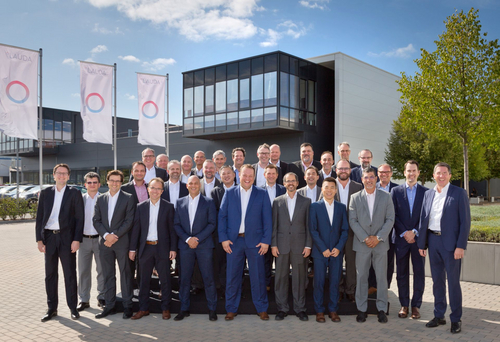
LAUDA’s international leaders gather each year to exchange ideas and for next year’s strategic planning. In 2019, the World Jour Fixe once again took place at headquarters in Lauda-Königshofen.
LAUDA leadership team meets at the seventh World Jour Fixe
The LAUDA international leadership team completed a week of intensive work, constructive discussion, and strategic decision-making. This was the annual World Jour Fixe, where the managing directors of all the twelve foreign businesses gather to meet with the leadership group of LAUDA DR. R. WOBSER GMBH & CO. KG. This event took place for the seventh time, and, after Barcelona, was back in its traditional headquarters in Lauda-Königshofen.
The aim of the meeting of international leaders is the direct and intensive exchange of information about collaborative projects and the strategic goals of all the LAUDA companies active on the global market. Global strategies were on the agenda alongside an extensive view of the development of the individual business sectors and the planning for the following year. Consistent customer orientation of the international sales and marketing logistics of the global market leader were discussed under the label of GOAL (Global Ordering and Logistics). An additional item at the forefront of this year’s event was the advancing integration of the GFL Gesellschaft für Labortechnik mbH, which was acquired by LAUDA at the end of last year.
The direct exchange between all participants is a significant factor for the company culture of LAUDA. For this reason, the annual World Jour Fixe has a constant entry in LAUDA’s diary. President and CEO, Dr. Gunther Wobser says: “The international meeting reinforces the trust and collaboration between the worldwide LAUDA companies. This year the feedback was staggering and our route to becoming a global company was confirmed” In addition to digitalization, the healthy growth of the company benefited markedly from “intensive personal communication at the level of equals”.
In addition to the strategic tasks, the collegial interchange amongst the participants did not miss out, for example, there was a visit to the Königshöfer Fair and a joint tour of the Marienburg Castle in the neighboring university city of Würzburg.

